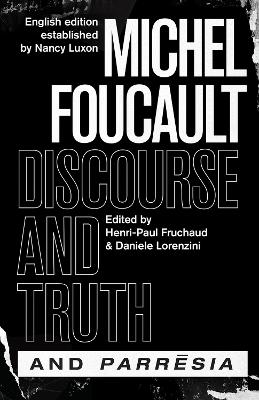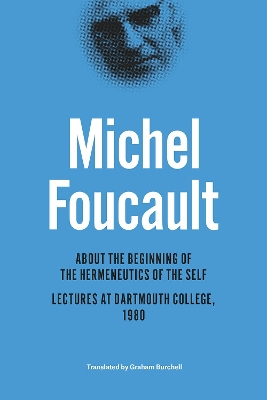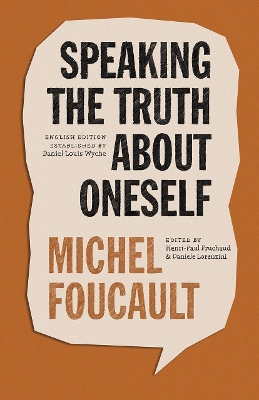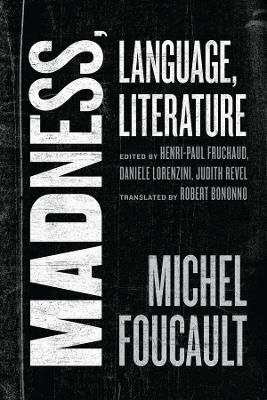Chicago Foucault Project
4 total works
The volume collects a series of lectures given by the renowned French thinker Michel Foucault late in his career. The book is composed of two parts: a talk, "Parresia," delivered at the University of Grenoble in 1982, and a series of lectures entitled "Discourse and Truth," given at the University of California, Berkeley in 1983, which appears here for the first time in its full and correct form. Together, they provide an unprecedented account of Foucault's reading of the Greek concept of parresia, often translated as "truth-telling" or "frank speech." In typically Foucauldian style, the lectures trace the transformation of this concept across Greek, Roman, and early Christian thought, from its origins in pre-Socratic Greece to its role as a central element of the relationship between teacher and student. In mapping the concept's history, Foucault's concern is not to advocate for free speech; rather, his aim is to explore the moral and political position one must occupy in order to take the risk to speak truthfully. In his analysis of parresia, Foucault both advances his project of a history of the present and paves the way for a genealogy of the critical attitude in modern and contemporary societies.
These essays--carefully edited and including notes and introductory material to fully illuminate Foucault's insights--are a major addition to Foucault's English-language corpus that no scholar of ancient or modern philosophy will want to miss.
These essays--carefully edited and including notes and introductory material to fully illuminate Foucault's insights--are a major addition to Foucault's English-language corpus that no scholar of ancient or modern philosophy will want to miss.
In 1980, Michel Foucault began a vast project of research on the relationship between subjectivity and truth, an examination of conscience, confession, and truth-telling that would become a crucial feature of his life-long work on the relationship between knowledge, power, and the self. The lectures published here offer one of the clearest pathways into this project, contrasting Greco-Roman techniques of the self with those of early Christian monastic culture in order to uncover, in the latter, the historical origin of many of the features that still characterize the modern subject. They are accompanied by a public discussion and debate as well as by an interview with Michael Bess, all of which took place at the University of California, Berkeley, where Foucault delivered an earlier and slightly different version of these lectures. Foucault analyzes the practices of self-examination and confession in Greco-Roman antiquity and in the first centuries of Christianity in order to highlight a radical transformation from the ancient Delphic principle of "know thyself" to the monastic precept of "confess all of your thoughts to your spiritual guide."
His aim in doing so is to retrace the genealogy of the modern subject, which is inextricably tied to the emergence of the "hermeneutics of the self"-the necessity to explore one's own thoughts and feelings and to confess them to a spiritual director-in early Christianity. According to Foucault, since some features of this Christian hermeneutics of the subject still determine our contemporary "gnoseologic" self, then the genealogy of the modern subject is both an ethical and a political enterprise, aiming to show that the "self" is nothing but the historical correlate of a series of technologies built into our history. Thus, from Foucault's perspective, our main problem today is not to discover what "the self" is, but to try to analyze and change these technologies in order to change its form.
His aim in doing so is to retrace the genealogy of the modern subject, which is inextricably tied to the emergence of the "hermeneutics of the self"-the necessity to explore one's own thoughts and feelings and to confess them to a spiritual director-in early Christianity. According to Foucault, since some features of this Christian hermeneutics of the subject still determine our contemporary "gnoseologic" self, then the genealogy of the modern subject is both an ethical and a political enterprise, aiming to show that the "self" is nothing but the historical correlate of a series of technologies built into our history. Thus, from Foucault's perspective, our main problem today is not to discover what "the self" is, but to try to analyze and change these technologies in order to change its form.
Just before the summer of 1982, French philosopher Michel Foucault gave a series of lectures at Victoria University in Toronto. In these lectures, which were part of his project of writing a genealogy of the modern subject, he is concerned with the care and cultivation of the self, a theme that becomes central to the second, third, and fourth volumes of his History of Sexuality. Throughout his career, Foucault had always been interested in the question of how constellations of knowledge and power produce and shape subjects, and in the last phase of his life, he became especially interested not only in how subjects are formed by these forces, but in how they ethically constitute themselves.
In this lecture series and accompanying seminar, Foucault focuses on antiquity, starting with classical Greece, the early Roman Empire, and concluding with Christian monasticism in the fourth and fifth centuries AD. Foucault traces the development of a new kind of verbal practice-"speaking the truth about oneself"-in which the subject increasingly comes to be defined by its inner thoughts and desires. He deemed this new form of "hermeneutical" subjectivity important not just for historical reasons but also due to its enduring significance in modern society. Is another form of the self possible today?
In this lecture series and accompanying seminar, Foucault focuses on antiquity, starting with classical Greece, the early Roman Empire, and concluding with Christian monasticism in the fourth and fifth centuries AD. Foucault traces the development of a new kind of verbal practice-"speaking the truth about oneself"-in which the subject increasingly comes to be defined by its inner thoughts and desires. He deemed this new form of "hermeneutical" subjectivity important not just for historical reasons but also due to its enduring significance in modern society. Is another form of the self possible today?
Newly published lectures by Foucault on madness, literature, and structuralism.
Perceiving an enigmatic relationship between madness, language, and literature, French philosopher Michel Foucault developed ideas during the 1960s that are less explicit in his later, more well-known writings. Collected here, these previously unpublished texts reveal a Foucault who undertakes an analysis of language and experience detached from their historical constraints. Three issues predominate: the experience of madness across societies; madness and language in Artaud, Roussel, and Baroque theater; and structuralist literary criticism. Not only do these texts pursue concepts unique to this period such as the "extra-linguistic," but they also reveal a far more complex relationship between structuralism and Foucault than has typically been acknowledged.
Perceiving an enigmatic relationship between madness, language, and literature, French philosopher Michel Foucault developed ideas during the 1960s that are less explicit in his later, more well-known writings. Collected here, these previously unpublished texts reveal a Foucault who undertakes an analysis of language and experience detached from their historical constraints. Three issues predominate: the experience of madness across societies; madness and language in Artaud, Roussel, and Baroque theater; and structuralist literary criticism. Not only do these texts pursue concepts unique to this period such as the "extra-linguistic," but they also reveal a far more complex relationship between structuralism and Foucault than has typically been acknowledged.



